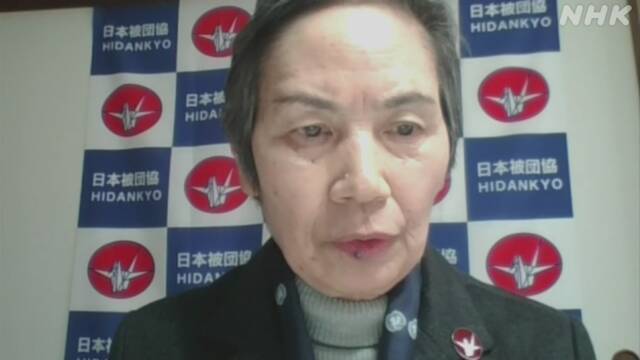In response to a series of remarks from some of the ruling and opposition parties regarding the revision of the Three Non-Nuclear Principles in connection with Russia's invasion of Ukraine, the Japan Confederation of Atomic Bombs = Japan Confederation of Atomic Bomb Victims held a press conference. It undermines the effort of "not creating atomic bomb survivors". "
In response to the situation in Ukraine, some of the ruling and opposition parties have made a series of remarks on the policy of sharing and operating US nuclear weapons among allies and the review of the three non-nuclear principles, of which the Nippon Ishin no Kai will start discussions on the 2nd. I decided to make a recommendation to the government.
In response to this situation, the Japan Confederation of Atomic Bombs, which is formed by A-bomb survivor groups nationwide, held an online press conference, and Shigemitsu Tanaka (81), who was bombed in Nagasaki, said, "Since its formation 66 years ago, it will not create survivors again." He continued the movement with his own thoughts and overturned the efforts of those who led to the entry into force of the Treaty on the Prohibition of Nuclear Weapons.
In addition, Deputy Secretary-General Seiko Wada (78), who was also bombed in Nagasaki, said, "Because the threat of nuclear weapons is increasing, Japan should increase its momentum to participate in the Treaty on the Prohibition of Nuclear Weapons. It's really a shame that there is a move that seems to neglect the principles. "
On the 2nd, the Japan Confederation Association sent a statement requesting the withdrawal of the proposal to the Nippon Ishin no Kai.
Nagasaki Prefecture Atomic Bomb Survivor's Handbook Tomo no Kai Chairman "Staying on the Three Non-Nuclear Principles"
Manzao Tomonaga, the chairman of the Nagasaki Prefecture Atomic Bomb Survivor's Association and a member of the Ministry of Foreign Affairs' "Sage Council for Promoting Nuclear Weapons", told NHK about the debate over the policy of sharing and operating nuclear weapons. It is irresponsible to propose that there is only "nuclear sharing" by looking only at Ukraine, "he emphasized the idea that the Japanese government should adhere to the three non-nuclear principles.
Students working on the abolition of nuclear weapons ...
College students engaged in peace activities such as the abolition of nuclear weapons expressed disappointment and resentment.
Yuta Takahashi, a third-year university student from Hiroshima who has been engaged in activities such as collecting testimonies of A-bomb survivors, said, "I am concerned that discussions on nuclear weapons are going too easily. I feel that my memory is fading. I can't help but talk about nuclear weapons from the perspective of damage, but only from the perspective of security. "
In addition, Ryoka Nakamura, a third-year university student from Nagasaki, said, "I have a feeling of helplessness that I have never felt before. The word" protect the country "that politicians say should not drop nuclear weapons in their own country. It sounds like it's coming from a simple idea. It may be difficult to imagine what would happen if nuclear weapons were used without touching the threat of nuclear weapons. But that's why I think we should refocus on the consequences of nuclear weapons inhumane destruction. "
What is "shared nuclear weapons"?
The policy of sharing and operating nuclear weapons among allies has been adopted between the United States and some non-owners of the NATO = North Atlantic Treaty Organization.
It is a mechanism that puts nuclear weapons managed by the United States on the territory of each country, and in an emergency, under the decision of the United States, mounts and operates nuclear weapons on military aircraft of that country.
According to the NATO homepage, Belgium, Germany, Italy, the Netherlands, and Turkey have US nuclear weapons deployed under this policy.
If this mechanism were to be adopted between the United States and Japan, it would violate the "Three Non-Nuclear Principles" because American nuclear weapons would be brought into Japan, and Defense Minister Kishi told reporters on the 1st. "It is not recognized because we adhere to the Three Non-Nuclear Principles," he said.
Three Non-Nuclear Principles and Nuclear Weapons
The Three Non-Nuclear Principles, which stipulate that nuclear weapons should not be possessed, made, or brought in, were resolved by the Diet in 1971, given that Japan is the only country exposed to the war.
In 1954, the crew of the tuna fishing boat "Daigo Fukuryu Maru" in Shizuoka Prefecture was exposed to a hydrogen bomb test in the United States, and the movement to ban atomic bombs increased in Japan.
Then, in 1955, the Atomic Energy Basic Law was enacted, and the use of nuclear energy was limited to peaceful purposes.
In 1976, Japan ratified the NPT = Nuclear Non-Proliferation Treaty, and the manufacture and possession of nuclear weapons was completely prohibited by law in conjunction with the Atomic Energy Basic Law.
On the other hand, it was pointed out that among the three non-nuclear principles, "don't bring in" is not legally prohibited, and it should be discussed based on the fact that it is protected by the American nuclear umbrella. There is also.
However, successive administrations have consistently adhered to the Three Non-Nuclear Principles as the "national policy" of the A-bombed country, Japan.
Chief Cabinet Secretary Matsuno also said at a press conference on the 1st, "The government has the same idea of adhering to the Three Non-Nuclear Principles as a policy policy."

